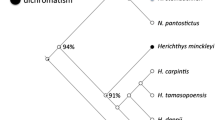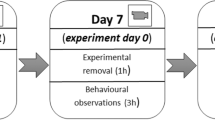Abstract
Theoretical models predict that parents should adjust the amount of care both to their own and their partner’s body condition. In most biparental species, parental duties are switched repeatedly allowing for repeated mutual adjustment of the amount of care. In the mouthbrooding cichlid Eretmodus cyanostictus, terms are switched only once with females taking the first share. The timing of the shift of the clutch between mates strongly determines both partners’ brooding period and thereby their parental investment. Females signal their readiness to transfer the young several days before the male finally takes them, suggesting sexual conflict over the timing of the shift. In a lab experiment, we reduced the body condition of either the female or the male of a pair to test whether energy reserves affect the timing of the shift and whether female signalling behaviour depends on energetic state. Males with a lowered condition took the young later and incubated for a shorter period, which prolonged the incubation time of their female partners. When female condition was lowered, female and male incubation durations remained unchanged, although females signalled their readiness to shift more intensely. Our results suggest that males adjust their parental investment to own energy reserves but are unresponsive to their mate’s condition. Females appear to carry the entire costs for the male’s adjustment of care. We propose that intrinsic asymmetries in the scope for mutual adjustment of parental investment and the costs of negotiation crucially influence solutions of the conflict between sexes over care.



Similar content being viewed by others
References
Barta Z, Houston AI, McNamara JM, Székely T (2002) Sexual conflict about parental care: the role of reserves. Am Nat 159:687–705
Clutton-Brock TH (1991) The evolution of parental care. Princeton Univ. Press, Princeton, NJ
Daan S, Dijkstra C, Tinbergen JM (1990) Family planning in the kestrel (Falco tinnunculus): the ultimate control of covariation of laying date and clutch size. Behaviour 114:83–116
Golet GH, Irons DB (1999) Raising young reduces body condition and fat stores in black-legged kittiwakes. Oecologia 120:530–538
Grüter C, Taborsky B (2004) Mouthbrooding and biparental care: an unexpected combination, but male brood care pays. Anim Behav 68:1283–1289
Grüter C, Taborsky B (2005) Sex ratio and the sexual conflict about brood care in a biparental mouthbrooder. Behav Ecol Sociobiol 58:44–52
Horak PS, Jenni-Eiermann S, Ots I (1999) Do great tits starve to reproduce? Oecologia 119:293–299
Houston AI, Davies NB (1985) The evolution of cooperation and life history in the dunnock Prunella modularis. In: Sibly RM, Smith RH (eds) Behavioural ecology. Blackwell Scientific, Oxford, pp 471–487
Houston AI, Szekely T, McNamara JM (2005) Conflict between parents over care. Trends Ecol Evol 20:33–38
Itzkowitz M, Draud MJ (1992) Conspecific intruders influence pair formation in a monogamous fish. Behav Processes 28:59–64
Kuwamura T, Nagoshi M, Sato T (1989) Female-to-male shift of mouthbrooding in a cichlid fish, Tanganicodus irsacae, with notes on breeding habits of two related species in Lake Tanganyika. Env Biol Fishes 24:187–198
Markman S, YomTov Y, Wright J (1995) Male parental care in the orange-tufted sunbird—behavioral adjustments in provisioning and nest guarding effort. Anim Behav 50:655–669
Markman S, YomTov Y, Wright J (1996) The effect of male removal on female parental care in the orange-tufted sunbird. Anim Behav 52:437–444
McCormick MI, Hoey AS (2004) Larval growth history determines juvenile growth and survival in a tropical marine fish. Oikos 106:225–242
McNamara JM, Gasson CE, Houston AI (1999) Incorporating rules for responding into evolutionary games. Nature 401:368–371
McNamara JM, Houston AI, Barta Z, Osorno J-L (2003) Should young ever be better off with one parent than with two? Behav Ecol 14:301–310
Mock DW, Fujioka M (1990) Monogamy and long-term pair bonding in vertebrates. Trends Ecol Evol 5:39–43
Morley JI (2000) Intraspecific competition and monogamy in the cichlid fish, Eretmodus cyanostictus. PhD thesis, University of Cambridge, Cambridge UK
Morley JI, Balshine S (2002) Faithful fish: territory and mate defence favour monogamy in an African cichlid fish. Behav Ecol Sociobiol 52:326–331
Mrowka W (1982) Effect of removal on the parental care behaviour of the biparental cichlid Aequidens paraquayensis. Anim Behav 30:295–297
Parker GA, Royle NJ, Hartley IR (2002) Intrafamilial conflict and parental investment: a synthesis. Philos Trans R Soc Lond B 357:295–307
Sanz JJ, Kranenbarg S, Tinbergen JM (2000) Differential response by males and females to manipulation of partner contribution in the great tit Parus major. J Anim Ecol 69:74–84
Schürch R, Taborsky B (2005) The functional significance of buccal feeding in the mouthbrooding cichlid Tropheus moorii. Behaviour 142:265–281
Smith C, Wootton RJ (1995) The cost of parental care in teleost fishes. Rev Fish Biol Fish 5:7–22
Steinegger M (2005) Sexual conflict over parental care and the function of female display behaviour in the biparental cichlid Eretmodus cyanostictus. Masters thesis, University of Bern, Bern, Switzerland
Székely T, Cuthill IC (2000) Trade-off between mating opportunities and parental care: brood desertion by female Kentish plovers. Proc R Soc Lond B 267:2087–2092
Székely T, Webb JN, Houston AI, McNamara JM (1996) An evolutionary approach to offspring desertion in birds. In: Nolan V Jr, Ketterson ED (eds) Current Ornithology, vol 13. Plenum, New York
Taborsky B, Foerster K (2004) Female mouthbrooders adjust incubation duration to perceived risk of predation. Anim Behav 68:1275–1281
Trivers RL (1972) Parental investment and sexual selection. In: Campbell B (ed) Sexual selection and the descent of man. Aldine, Chicago, pp 136–179
Wright J, Cuthill I (1989) Manipulation of sex-differences in parental care. Behav Ecol Sociobiol 25:171–181
Yanagisawa Y, Sato T (1990) Active browsing by mouthbrooding females of Tropheus duboisi and Tropheus moorii (Cichlidae) to feed the young and/or themselves. Environ Biol Fish 27:43–50
Acknowledgements
We thank Michael Taborsky and Christoph Grüter for helpful discussions throughout this study, Rolf Eggler for logistic and technical support and Dolores Schütz for assistance with the experiments. The experiments were conducted under the license of the Veterinary Office of Kanton Bern, Switzerland (license no. 31/05). B.T. acknowledges the financial support by the Forschungsstiftung, University of Bern (48/2003).
Author information
Authors and Affiliations
Corresponding author
Additional information
Communicated by K. Lindström
Rights and permissions
About this article
Cite this article
Steinegger, M., Taborsky, B. Asymmetric sexual conflict over parental care in a biparental cichlid. Behav Ecol Sociobiol 61, 933–941 (2007). https://doi.org/10.1007/s00265-006-0322-x
Received:
Revised:
Accepted:
Published:
Issue Date:
DOI: https://doi.org/10.1007/s00265-006-0322-x




